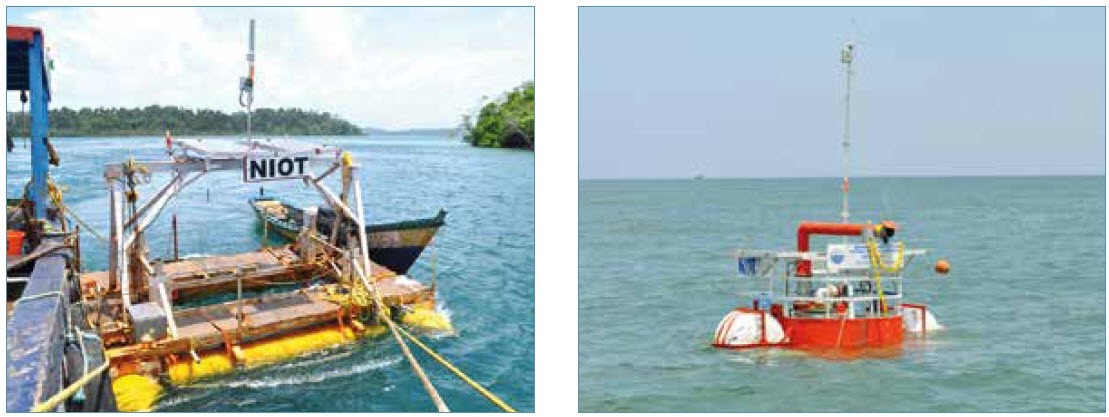INDIA
The National Institute of Ocean Technology under the Ministry of Earth Sciences carries out research and development activities related to ocean energy. Relevant R&D projects are listed below.
RELEVANT R&D PROJECTS
Wave Energy:
Two types of floating wave energy devices, namely the backward bent ducted buoy (BBDB) and the wave powered navigational buoy, are being currently developed and optimized for off grid small power requirements in remote locations.
A unidirectional impulse (UDI) turbine for wave energy conversion was developed with an optimum match between the BBDB and the turbine. The open sea trials of the BBDB with the optimized turbine led to successful power generation as per design.
The development of a wave powered navigational buoy is underway by carrying out numerical studies using computational fluid dynamics (CFD) principles and physical experimentation on small scale models in wave flume. The first prototype is ready for fabrication and will be tested off Chennai.
Pareto optimization studies using genetic algorithm have been carried out on the geometry of an existing bidirectional flow impulse turbine. Efforts so far indicate an improved turbine performance and further improvement is expected. A comparison between bi directional and twin unidirectional impulse turbines will be made for the final choice for scaled up devices.
OTEC:
India continues to carry out research in the area of ocean thermal energy conversion. The main focus of the research is on development of OTEC turbines, heat exchangers and deep sea cold water conduit. A state of the art laboratory to carry out experiments on various components of OTEC and LTTD is being setup in the campus of the National Institute of Ocean Technology at Chennai. OTEC cycle in this setup will be powered by a turbine that has been designed in-house. The facility is expected to be fully operational in the year 2017.
The low temperature thermal desalination plants set up on the islands by the National Institute of Ocean Technology continue to function and generate water. These plants use diesel generators to supply power for the pumps. To avoid dependence on external power sources, the Government of India has decided to fund an OTEC powered desalination plant on an island in the Lakshadweep group in the Arabian Sea. The design has commenced and implementation will begin once the formal approvals are received in early 2017.
Marine Currents:
A small rating marine hydrokinetic turbine was developed through CFD analysis, laboratory testing and constant speed seawater channel testing. The turbine generated electricity and performed satisfactorily during the open sea trials conducted in 2016 on Andaman Islands in the Bay of Bengal. This turbine has worked in the tidal stream but can also be used for open ocean currents. A scaled-up turbine is being designed for installation in mid-2017.
The marine hydrokinetic turbines for Indian waters will have low speeds and medium range torques. Alternators for such combinations are not available in the market. To this end expertise has been developed in NIOT to design such alternators and they are being locally fabricated.

Floating current turbine tested on Andamans (left) BBDB sea trial with φ 196 mm UDI turbine off Chennai coast (right)



